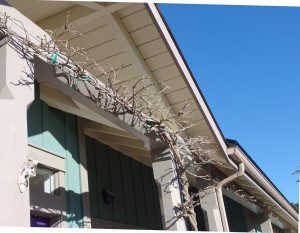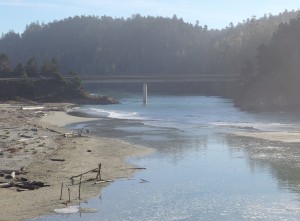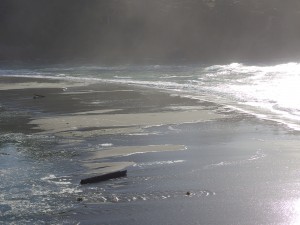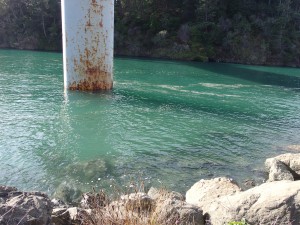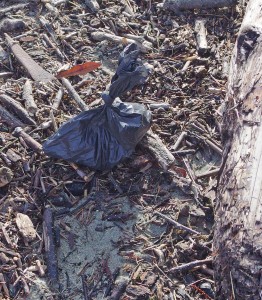Archive for January, 2014
Pruning the Wisteria
I spent the morning pruning the wisteria vine that grows along our front porch. Up and down the tallest stepladder, leaning over the porch beam to reach the longest stems, I snipped and thinned. Each time I do this task, I remember with gratitude the workshop I attended years ago at the Elizabeth F. Gamble Garden in Palo Alto. “Be ruthless if you want flowers,” the instructor said. Ruthless I am. Otherwise the new growth pushes between the porch beam and ceiling, wraps itself round the lamp above the front door and seeks to enter the house itself.
Wisteria is not for the faint of heart. In May, as soon as the magnificent double purple flowers have bloomed and dropped, the new stems start growing. If left their own devices, they can reach ten feet in a year. As soon as they threaten to strangle visitors at the front door, I whack back as many as I can reach with my pole pruner. I may have to do this several times during the summer. In fall I haul out the big stepladder and take back all the foliage to somewhere near its supporting wire. However, in our mild coastal climate, the leaves don’t drop until well into the winter. It’s only then that I can see the structure I have trained over the years and can scrutinize each branch that sprouts from the main stem, looking for crossed twigs, dead wood, and stems facing back toward the house.
It’s a strenuous task. But when it is done, the prunings composted and the porch swept, there’s such a sense of satisfaction in looking up at the vine and seeing the shape of it against the house.
A Little House for Poetry
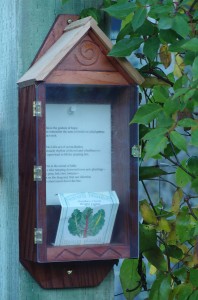 The idea came from an article in the Sept.-Oct. 2013 issue of Poets & Writers Magazine about a project to erect small installations, called poetry boxes, in public places. Their purpose, according to the artist, is to “connect people to landscape by combining poetry, visual art, and nature observation.”
The idea came from an article in the Sept.-Oct. 2013 issue of Poets & Writers Magazine about a project to erect small installations, called poetry boxes, in public places. Their purpose, according to the artist, is to “connect people to landscape by combining poetry, visual art, and nature observation.”
I decided to design a poetry box for myself. A simple little house, with just a touch of decoration: a carved spiral to symbolize the continuity of life, and a line of chevrons to signify water. I have no skill at woodwork, but my husband Tony does, and he readily agreed to take my plan and build it.
Here it is, mounted on the 6” x 6” gatepost of my fenced vegetable garden. The laminated text is thumbtacked to the back of the box, so that I can change it whenever I want to. For its debut, I placed an empty seed packet on the floor of the house and pinned up a few lines from my poem “Winter Greens,” which is published in my collection Rogue Wave at Glass Beach.
This is the gesture of hope:
to remember the taste of fresh-cut salad greens
and act on it.
This is the act of reconciliation:
muscle rhythm of shovel and wheelbarrow,
load upon load to fill the planting box.
This is the sound of faith:
a rake tamping down soil over new plantings—
snap peas, bok choi, lettuces—
tines on the diagonal, first one direction
then crisscrossed down the line.
Citizen/Science
A king tide this morning, and we’d heard that it would be useful for people to document how high the water came, so that we’d have some idea what to expect as climate change brings rises in sea level. An excellent excuse to amble down to Big River Beach in Mendocino with my new camera and practice getting my horizons horizontal.
We’ve had no major rainstorms yet this winter to wash out the sandbar that builds up at the mouth of the river. From a vantage point on the cliff, we watched the tide creep over the bar, then took the old steps down to the beach to check on the tide height at the bridge. Yes, the water was high, too high to walk on sand and touch the bridge pier, as we can usually do.
Strolling back along the tide line, we were enjoying the peace and quiet beauty of the scene when I noticed something that set my teeth on edge: a plastic dog poop bag discarded by a driftwood log. I’ve seen such offerings frequently around this region: beside a signpost, on the edge of a trail. I want to shake the humans who leave them, who are so unclear on the concept of citizenship they have no thought for the environmental mess they are causing. It’s no wonder the sea level is rising.
